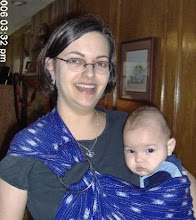Wednesday, April 01, 2009
Grand Rounds
Sunday, March 01, 2009
Is VBAC illegal? Is homebirth illegal?
You may also be interested in my previous blog post, Is it legal for Florida midwives to do VBACs?
Oh, and if you haven't read it yet, don't miss Time magazine's article The Trouble With Repeat Cesarians in conjunction with ICAN's recently-released report on the organization's hospital survey. I especially liked this quote from the Time article:
But while many obstetricians say fewer patients are requesting VBACs, others counter that the medical profession has been too discouraging of them. Dr. Stuart Fischbein, an ob-gyn whose Camarillo, Calif., hospital won't allow the procedure, is concerned that women are getting "skewed" information about the risks of a VBAC "that leads them down the path that the doctor or hospital wants them to follow, as opposed to medical information that helps them make the best decision." According to a nationwide survey by Childbirth Connection, a 91-year-old maternal-care advocacy group based in New York City, 57% of C-section veterans who gave birth in 2005 were interested in a VBAC but were denied the option of having one.Hm. Why give patients information about a "procedure" that is not offered by you or allowed by your hospital?
Thursday, February 19, 2009
Midwifery Care in Canada
The practice of midwifery in Canada is regulated by provincial and territorial authorities. Midwives can only legally practice their profession if they are registered with these authorities, but only seven provinces and territories have regulatory systems in place. This means that midwifery is essentially illegal in the rest of Canada. Further compounding the problem is the fact that even where midwifery is legal, it isn’t always funded or covered by health care. A two-tier system of care has been established, where the standard of maternal care changes depending on your geographic location. Midwives are only available to some women, in some parts of the country, and only some of those women can afford their services.
Tuesday, February 10, 2009
Traveling mothers still "face hurdles"
Ernst & Young, the New York City financial services company, provides free travel kits so that women on business trips can ship milk home to their babies. And the Boston Consulting Group, a management consulting firm based in Boston, helps women bring their babies on business trips by covering travel expenses for the infant and a baby sitter.
Ms. [Suzanne] Riss [editor-in-chief of Working Mother magazine] called such programs “very cutting edge” and noted that they “go a long way” toward creating loyal employees. “But they’re still the exception, not the rule,” she added.
Sunday, January 11, 2009
Top 'Lawyer Mom' Blogs
Check out the other blogs on the list - there are some good ones. And you can find a wealth of information at Darling Hill, which is "the blog that’s devoted to that place where life and flexible lawyering meet. A 100% lawyer-parent friendly legal niche."
Saturday, January 03, 2009
FDA raids Miami birth center; Placentas, medical records confiscated
"They charged in here as if I were making crack cocaine," Daniels complained. "They could have sent one person and we should have shown them everything." She suggested that the raid might have been caused by angry obstetricians, who charge several times what she does to deliver a baby. "The local docs are screaming their heads off.''
I am (obviously) a huge proponent of placenta encapsulation. However, I can not in any way condone this type of activity. I created the Training & Certification program specifically to avoid these types of situations.
As an advocate for the movement toward legitimizing the use of placenta for its natural purpose, this story is absolutely outrageous. People who operate with such a total lack of regard for the gravity of the process and who apparently do not realize that the FDA is not on our side, set the movement back and make it harder for the rest of us who are being safe and working toward legitimacy.
Please, people - don’t think that you can find free instructions for drying placentas on the internet and just set up shop. This is serious. You need to comply with government standards and regulations. Get some training. Work with us. Together we can do it. But not when people like this are operating out there.
White Collar Crime News blogger Jef Henninger has a lawyer's take on the situation:
I hate to see good people get caught up in criminal cases when the entire problem could have been easily avoided if a good attorney got in there and essentially performed an audit on the entire business....I don’t know enough about the facts of this case to really figure out what the situation is here, but I see no indication that anyone was harmed. At the most, it seems like they had sloppy business practices while they performed a service that the people wanted; but the FDA does not agree with. This seems like it would be a good case for a lawyer to argue that this is a technical violation of civil law and not a criminal violation as no one was actually harmed.
Update 1/08/2008: For more information and continuing updates, please visit The Placenta Blog.



